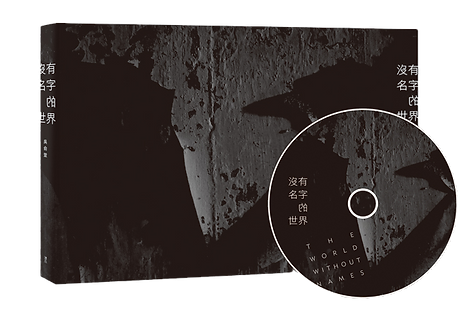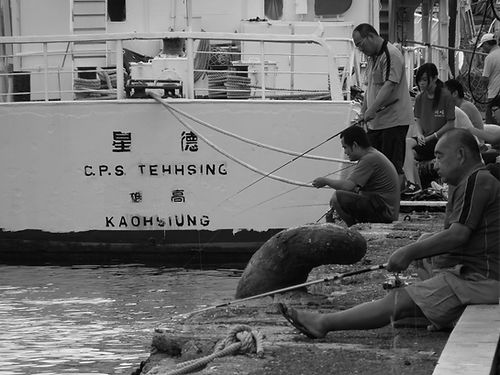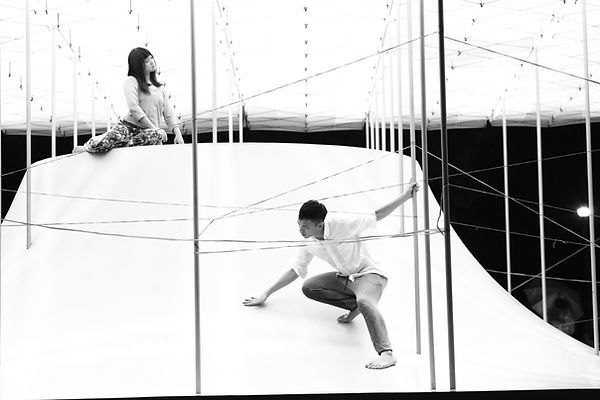
The World without Names
Author: Yu-Hsuan Wu
Publisher: comma BOOKS
Year: 2016
Language: Bilingual (Chinese-English)
Pages: 174
ISBN: 978-986-92786-1-4
【About the Book】
While others embrace the light, she walks into the valley of the shadow of death and kisses the hidden truths. In The World Without Names, poet Yu-Hsuan Wu enters the industrial fringes of Kaohsiung, observing with cool patience. Through poetry and imagery, she unveils a world beyond celebration or grief—a nameless world.
Includes a sound poetry CD album with nine experimental tracks. Recipient of the 2012 and 2015 Writing Kaohsiung Awards from the Kaohsiung Bureau of Cultural Affairs.
【Author’s Note】
That year, I moved to Kaohsiung and asked: "Is there a kind of nature within this industrial terrain devoid of scenic beauty?" I wandered the factory peripheries, refusing to name what I saw, letting the landscapes emerge as they were. I longed to plunge into the depths of existence and encounter the self beyond borders.
【Selected Works】
Chance
What is chance?
either when we have been waiting for so long
but nothing changes, or
when we have changed for so long
but are no longer patient with
waiting
Day after day we
watch the surface of water splitting
the next moment
suturing voluntarily
nothing else inside
emerges
except
the light and shadow accidentally
bring us illusions
Still we are waiting for
destiny overlooks—
just like us
being dropped from the surface of water
the one who is tired of waiting
but never leaving
At that moment, we
stretch out our hands
pull him up arduously
sit shoulder to shoulder by the shore
watch the surface of water suturing
without any
crevice
no one will attempt to ask
who each one’s chance is
(Translated by Lin-Chin Tsai)
This poem was included in the New Feathers Anthology, 2021.
【Reviews & Reflections】
“If the cinematic quality of Yu-Hsuan’s previous anthology, Exchanging Lovers’ Ribs, guides her readers to experience “the destitute time”, then in The World without Names, this visuality is further developed into a kind of performativity: the personae in the poems all become actors and dramatically perform. If the word “actor” can be interpreted not only as a theater actor but also as the actor who takes an action and actively engages in this world, then we clearly see how a poet can participate in and intervene in the real world through her poetic performance. Through each aperture and scene in her poems, what remains invisible and unspeakable within this world is therefore actualized.”
—Lin-Chin Tsai, “The Adventure of the Translator”
“If Exchanging Lovers’ Ribs is Butoh, then The World without Names is a profound gaze. It is the spotlight of daily life, awakening and awareness. Through the awareness and insight of her poems, she identifies the world for strangers, creatures, and even the inanimate.”
—Ming-Hsin Jen, “She Identifies Everything from Emptiness: Reading Yu-Hsuan and The World without Names”
“These verses are chisels of revelation, as every good poem carves the scenery into the models of our destinies. It is the destinies hiding behind the scenery that drive, destroy and, just as Michelangelo said, emancipate these models. We who engage in sculpturing thereby loosen ourselves, crevices come into being, and our names are erased. Strength grows within crevices. Only the world will stay after names are erased.”
—Fangyi Liu, “We Knew Each Other in Hell…”
“I can share my love with you. Speaking with you, I can carry out my love, and at the same time, lose my struggle. It wasn’t like removing the cover, but like shedding my lovey tumor. It is in this limited time, limited body and mind allow me to do this, only this. As to those parts of the world within my heart, I devote them to you. Leaving them to you, I know things will certainly go well so that I can rest assured. We are not the same, but we love. You do whatever you want. Everything will be as it should be. I feel like crying, but I cannot.”
—finezi, “YOURS”
“Each poem in The World Without Names is a complete manifestation of gravity. These are poems full of weight—but they do not merely bear gravity. I would even say they are capable of altering its direction, turning heaven and earth upside down. That is why they carry a profound sense of groundedness while also embracing a strange, poetic lift-off.”
—Shen Mian, “A Person Without a Land: Reading Yu-Hsuan Wu’s The World Without Names”
【Performance Record】
In 2016, these poems were performed through experimental sound, site-specific installations, and Butoh improvisation at the Fongshan Naval Radio Station in Kaohsiung and within large-scale installations at the Taipei Fine Arts Museum.

